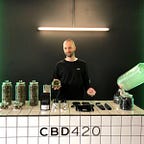Cannabis, women and the World Health Organization
A couple of weeks ago, I had the pleasure of meeting the committee that defended cannabis at the “Cannabis schedule reviewing” at the World Health Organization from November 12–16, organized by the entOURage Network, a platform to empower women in the cannabis industry, and paneled by female leaders in the cannabis industry:
- Julie P. Fry, M.Sc, Cannabis Activist
- Amy King, Development Director of Delta 9 Mexico
- Jessica Steinberg, co-founder of entOURage Network and Oxford PhD Student
I met with care-focused activists in non-profits in a relaxed environment to discuss cannabis — as a force of good rather than as a business.
We discussed ideas to raise awareness, help educate the public and patients but also covered user safety and decriminalization.
One of the main concerns we identified is that we need to raise not only awareness of cannabis, but relevant awareness. Not just to the general public. There needs to be a higher quality of information dissemination.
Another issue is the language currently used to write about cannabis. THC, CBD, Xanax and Prozac are all psychoactive substances in their scientific definition. This can create a lot of confusion. THC is psychoactive and psychotropic. CBD is only psychoactive. Hemp and cannabis are one and the same.
We also touched on the gender issue in the cannabis industry. Cannabis has a lot of women in top positions during this transitional phase towards legalization. But once the market becomes mainstream, the percentage of women involved decreases dramatically. We need to understand why that is happening and promote more gender balance.
From our discussions, I could see it was a great team to represent the interests of cannabis patients.
To round up, the global momentum that is building up and the solid scientific, social and economic arguments make us hopeful that cannabis will finally be taken seriously by politics. If cannabis can be descheduled, or at least rescheduled to a lower schedule category, the significance for governments around the world would be enormous as it would open the doors for governments to regulate the industry and create more opportunities for research and development.
At the event, I also met other influential figures of the cannabis world whose stories I want to highlight:
- Michael Krawitz is an amazing advocate and asset on the long term fight to (re)legalize cannabis. He is the Executive Director at Veterans For Medical Cannabis Access. Michael was injured while in service in Guam in an accident, and needed 13 surgeries to survive. Like me, he had to leave education (he was a high achiever in Virginia Tech) because of his medical condition. Since then, he spent his time advocating for cannabis and cannabis access, becoming a successful influence in pushing for better cannabis policy in the US state Virginia. This is a very concise summary, but you can read more here.
- Philip Rossner is a cannabis lobbyist in Germany. He’s pushed cannabis to progress significantly in one of the most conservative regions in Germany, he is now an advisor at a national level. His site is packed with insight on cannabis in German language and links to further German speaking activists and resources. He is an expert in finding unusual ways to advocate, including exposure from a story on his use of a former NATO bunker to grow cannabis.
